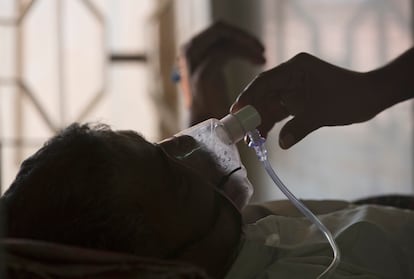Conflicts in Ukraine and Sudan fuel alarming surge in tuberculosis
Top U.N. officials and health industry leaders are trying to tackle an alarming surge in tuberculosis, which is now killing more people worldwide than Covid-19 or AIDS

Top U.N. officials and health industry leaders are trying to tackle an alarming surge in tuberculosis, which is now killing more people worldwide than Covid-19 or AIDS. Among the problems: a high number of cases in conflict zones, including Ukraine and Sudan, where it’s difficult to track down people with the disease and diagnose new sufferers.
Tuberculosis is the biggest infectious disease killer in the world today, taking the lives of around 4,400 people every day, including 700 children, Dr. Lucica Ditiu, executive director of the Stop TB Partnership, said before a hearing Monday to prepare for a high-level meeting in late September during the annual gathering of world leaders at the U.N. General Assembly.
Before Covid-19, which like TB is transmitted through the air, “we didn’t see very dramatic cases of TB,” she said, “but after Covid we saw a type of TB that we saw in… movies in which people spit blood and they are very weak, and so on.”
Ditiu said the economic impact of Covid and conflicts, first and foremost in Ukraine but now also in Sudan, are having “a huge impact” on efforts to treat people with TB and diagnose new cases.
Ukraine has the highest number of estimated people with TB in the European region — 34,000 — and also a high number with drug-resistant TB, she said at a news conference last week.
“It’s remarkable, the fact that the Ukrainian people are actually showing an amazing resilience in doing their best to maintain the services for TB,” Ditiu said. “But obviously a lot of people left the country.”
Nonetheless, she said, major efforts have been made to track down those with the disease, but what worries everyone is whether people in Ukraine have access to treatment.
In Sudan, 18,000 people received treatment for tuberculosis in 2021, according to the Stop TB Partnership, which is managed by the U.N. Office for Project Services and aims to achieve a world free of tuberculosis.
But Ditiu said the situation there for TB sufferers, because of the ongoing fighting and collapse of most of the health system, is “probably like a ticking bomb.”
She noted how fast a Covid-19 vaccine was developed, in less than a year, and lamented that it has taken 19 years to get three or four vaccines for TB to phase 3 trials because of a lack of money.
“Very often, unfortunately, TB is very forgotten,” she said, because “it affects usually people in the low-income countries with a lot of vulnerabilities.”
Among the U.N. officials speaking at Monday afternoon’s hearing are Deputy Secretary-General Amina Mohammed and World Health Organization Director-General Dr. Tedros Adhanom Ghebreyesus.
There are also two panels: one on fast-tracking access to TB services and the other on mobilizing financing to ramp up the TB response and advance research and innovation. It includes the chief medical officer for BioNTech, which with Pfizer used messenger RNA technology to make their Covid vaccine.
Ditiu said BioNTech and a few other companies are looking into using mRNA technology for a TB vaccine, which she said would have a big impact in more quickly trying to reduce and end the disease,
Sign up for our weekly newsletter to get more English-language news coverage from EL PAÍS USA Edition
Tu suscripción se está usando en otro dispositivo
¿Quieres añadir otro usuario a tu suscripción?
Si continúas leyendo en este dispositivo, no se podrá leer en el otro.
FlechaTu suscripción se está usando en otro dispositivo y solo puedes acceder a EL PAÍS desde un dispositivo a la vez.
Si quieres compartir tu cuenta, cambia tu suscripción a la modalidad Premium, así podrás añadir otro usuario. Cada uno accederá con su propia cuenta de email, lo que os permitirá personalizar vuestra experiencia en EL PAÍS.
¿Tienes una suscripción de empresa? Accede aquí para contratar más cuentas.
En el caso de no saber quién está usando tu cuenta, te recomendamos cambiar tu contraseña aquí.
Si decides continuar compartiendo tu cuenta, este mensaje se mostrará en tu dispositivo y en el de la otra persona que está usando tu cuenta de forma indefinida, afectando a tu experiencia de lectura. Puedes consultar aquí los términos y condiciones de la suscripción digital.








































